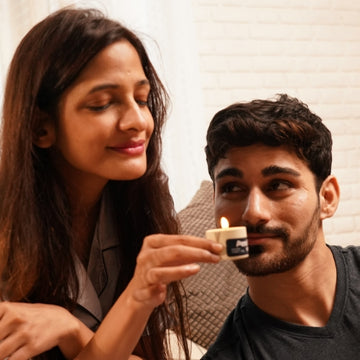The Cheat Sheet: Why Do People Cheat in Relationships?
Let’s understand why people cheat in relationships, and what we can do differently.
According to a 2020 survey by Gleeden, India’s first extramarital dating app (the app’s concept is wild but that’s for another blog 😅), 55% of married Indians admitted to cheating! But where is it all going wrong? Why do people cheat on people they love? Is monogamy really that hard, or are we just feeling more and more disconnected from everything in our lives?
The stereotype assumes that men cheat when they’re dissatisfied in bed, but for women, it’s an emotional disconnect that tips them over the edge. Boredom, low self-esteem, a deep-rooted fear of commitment and unresolved childhood trauma are all viable, researched reasons for why people cheat. While the world is filled with justifications- we also know that relationships are a two-way street, and there are tons of people (the rest of the 45% to be exact) who thrive off the companionship and support of their partner. What are they doing differently, and why is the rest of the world cheating? We’re here to answer.

“But I can’t talk to you!”
Why do people cheat in relationships? Because, unfortunately, we live in an individualistic society, and it’s easy to forget how important it is to find emotional support. Have you ever sat in a room full of people and still felt alone? For a lot of people, that’s what relationships begin to feel like. Day in and day out, you’re sleeping in the same bed with someone who doesn’t even know you. Marriages and relationships that age, often leave more room for disconnect- it begins with something as small as skipping plans, and forgetting to ask your partner about their day, and snowballs into not knowing who they are at all. People who cannot find this comfort and safety here, tend to look for it outside of their relationships.
“Where did the spark go?!”
This isn’t a one-size-fits-all analysis. Lack of intimacy in the bedroom can arise from a plethora of factors- whether it’s mismatched libido, a lack of communication about the way you experience and understand pleasure, performance anxiety, or even monotony- all of it affects relationships massively.
Long-term relationships leave very little room for new experiences and we know this can be frightening, but what we also know is that communication solves most things. Talk about things, encourage honesty and be open to reaching a middle ground. Think of the ‘spark’ as something you can manufacture, and invite spontaneity into your life. You can also try new things in the bedroom, like this Beat massager for men.
“I’m not sure I deserve this”
People with low self-esteem tend to rely on external sources for validation. When they feel inadequate or unworthy, receiving attention from someone outside their relationship can act as a quick fix, giving them a false, constructed sense of importance. Cheating might also feel like a way to regain a sense of value or power, especially if they feel overlooked or underappreciated by their partner. This kind of external validation can become addictive because it temporarily alleviates feelings of inadequacy.

‘I can make it worse”
As underhanded as it sounds, cheating is sometimes (consciously or subconsciously) used as a weapon. When a partner is seeking revenge for an emotional or physical wrong in the relationship, they tend to rely on infidelity as a tool. This tit-for-tat tactic isn’t necessarily the most healthy or effective way to resolve conflict in relationships.
‘I don’t know any better’
We all know that unresolved, deep-seated childhood issues can profoundly impact your adult life, especially your relationships. These early experiences shape how people connect emotionally. Adults with childhood trauma related to abandonment may use cheating as a defence mechanism to prevent being hurt. In this case, it isn’t about the thrill, but about maintaining a sense of emotional security. Children who experience chaotic, abusive, or controlling environments might develop a desire for control in their adult relationships. Cheating can provide a sense of power or autonomy that was absent in their early years. The only way through this is by actively unpacking and processing these emotions, and of course, seeking help.
‘Swipe right, Swipe left’
The world is changing and we’re all spoilt for choice. Dating apps are built to keep you swiping, and we’re losing touch with the art of stillness and patience. We’re encouraged, almost constantly, to seek ‘better’, do ‘better’, be ‘better’, and this translates into the way we view love. Nothing is good enough, we’re deluded into believing that something ‘better’ is right around the corner.

Want to know what long-lasting, truly happy couples are doing differently? The answer isn’t as glamorous as you’d like. We wish we knew how to make relationships as smooth as the best lubricant gels and oils, but there’s no quick fix. The only trick is encouraging regular, honest communication about emotional needs, expectations, and concerns. We all need to learn how to recognize and manage our own emotions and insecurities. Build a relationship with yourself, try this full body massager if you want a little extra TLC. Constant work, both on yourself and on the relationship with help you feel safe, and will make your relationship more resilient.
You may also like
AntiDate, The Couple's Play Book, Pulse






























































